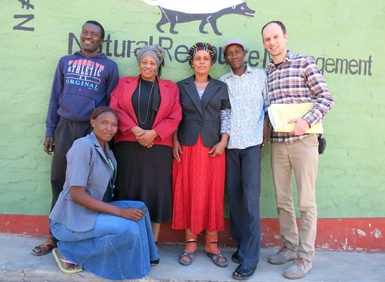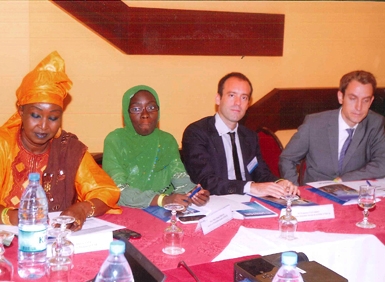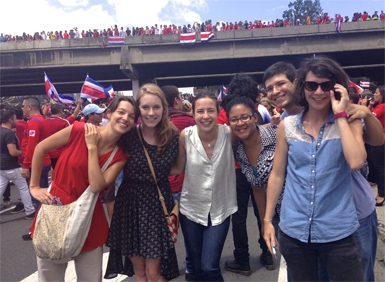Students share their 2014 summer experiences interning abroad
Each summer, NYU Law students travel the globe to intern in countries as diverse as India, Hungary, and Colombia in service of public interest. Last summer alone, the Public Interest Law Center (PILC) Summer Funding Program sent students to 28 countries, not including the US. The students gathered here went abroad last summer with the support of the Center for Human Rights & Global Justice’s International Law and Human Rights (ILHR) Fellowships, PILC, and Ford Foundation Fellowships.
Evan Alston ’16 worked at the Southern Africa Litigation Centre (SALC) in Johannesburg, South Africa: “I obtained this internship through the International Law and Human Rights Fellowship. SALC works to defend human rights and rule of law around Southern Africa by employing advocacy, impact litigation, and support for local NGOs in Southern African countries, among other tools. While at SALC, I worked on memos for each of the lawyers. Generally, they needed help either researching a certain set of facts or crafting a legal argument based on human rights precedent. The experience made me much likelier to spend time in the public interest sector earlier in my career. It also influenced the sort of international pro bono work I would seek to do in the private sector.”
Paige Casaly ’16 worked with the Mental Disability Advocacy Center (MDAC) in Budapest, Hungary: “I was referred directly to the legal director of MDAC through one of PILC’s career counselors; I emailed the legal director and then had a phone interview with her. MDAC is an international human rights organization that uses the law to promote equality and social inclusion of children and adults with intellectual disabilities and psycho-social disabilities. My duties mainly entailed doing background research to help with various cases on the MDAC docket, including jurisprudence and arguments used in similar cases that we could employ in MDAC briefs. For example, I wrote a memo on the US Supreme Court Olmstead decision and the strategies the Department of Justice has used in bringing cases to enforce it. I learned a lot about the European human rights system as well as common issues that arise in trying to enforce human rights anywhere within a judicial system. The internship definitely advanced my interest in working for an international human rights NGO. It also sparked a curiosity about working with domestic NGOs, which I hadn’t considered before.”
Anna Jay ’15 worked with the Human Rights Law Network in New Delhi, India: “I worked on a project to prepare for an Independent People’s Tribunal (IPT) to assess the rights situation of nomadic and ex-criminal tribes (nomadic tribes and denotified tribes, or NT-DNTs) in Maharashtra in central India. My work included conducting research on the legal status of NT-DNTs and drafting a comprehensive report with legislative and policy recommendations, designing a multi-indicator questionnaire to assess the situation of NT-DNT women, and collecting testimony and evidence from victims of rights violations in the field. I went on two field trips, one to Mumbai and one to rural Maharashtra. I will be carrying my internship experience forward by writing a paper on these tribes, perhaps looking into whether their socioeconomic requirements can be adequately met using the existing legal framework (that of social and economic rights and race/caste-based discrimination), or if a different framework (such as indigenous peoples’ rights) would better address their unique sociocultural position.”
Timothy McKenzie ’16 worked with the Hague Conference on Private International Law in The Hague, Netherlands: “I worked on the judgments project, which was dedicated to the preparation of a future instrument on the recognition and enforcement of foreign judicial decisions. In other words, we dealt with issues pertaining to how courts in one country would treat judicial decisions rendered in other countries. A good deal of my work centered on mass claims. I conducted research on various systems of collective redress in major global jurisdictions, such as the EU, Brazil, and China. Furthermore, I researched the potential barriers to enforcement of US class action judgments abroad. This not only afforded me the opportunity to learn quite a bit about international law but it also allowed me to work in a highly diverse environment. I ended up being the only intern from the US, and worked with people from Argentina, Australia, Canada, Japan, Germany, Spain and Latvia, among other countries.”
Taaj Reaves ’16 interned at Fundación Pro Bono in Bogotá, Colombia: “I first learned of the internship through a conversation I had with a previous Fundación Intern. He connected me with the director. By providing pro bono legal services, the Fundación Pro Bono Colombia aims to bridge the gap between vulnerable, marginalized, and underprivileged individuals and groups and the legal profession. While at Fundación, I developed new projects and ways of promoting and improving access to justice in Bogotá and met lawyers from some of the top Colombian law firms. I worked alongside professors at the Universidad de los Andes to develop a project on the pension program in Colombia. I translated documents from English to Spanish and vice versa and was also able to greatly improve my Spanish. Working at Fundación definitely reinforced my desire to work in the international realm and encouraged me to continue on the corporate path as there are many public interest opportunities in Latin American firms. It enhanced my desire to be at an intersection between the public and private sectors and affirmed my interests in commercial and transactional litigation.”
Patricia Shnell ’16 interned with Jerusalem Legal Aid and Human Rights Center through the Palestine Works in Jerusalem, Israel: “Palestine Works recruits American (and international) law students and pairs them with organizations in Israel and Palestine. The organizations work with Palestinian human rights through a range of different issues. I spent pretty much the entire summer working independently on a report about Israeli violations of the International Convention on Civil and Political Rights. I documented the way Israeli Defense Force complicity with settler violence violated the IDF’s international obligations under the treaty. My report will be submitted to the UN Human Rights Committee (the body governing the treaty) to be examined at their October periodic review of Israeli adherence to the treaty. This summer greatly shaped what I want to do in the future. Not only did it make me more interested in the region, but it also confirmed that I would very much enjoy a future career in international human rights.”
John Washington ’16 worked at the UN High Commissioner for Refugees (UNHCR) in Dakar, Senegal: “UNHCR is a large UN Agency that assists refugees, and internally displaced and stateless persons. The West Africa Region’s Protection unit works with national-level UNHCR offices, countries in the region and other partners to better protect these persons throughout the region. One of my contributions to the work was helping write the office’s position paper on a country in the region’s proposed bill to create a new system for asylum seekers. I also did a training of Senegal’s National Eligibility Commission (whose members determine the status of asylum seekers in Senegal) and relevant partners, such as the UN division of Senegal’s Ministry of Foreign Affairs. My portion of the training was on mens rea and individual criminal responsibility in international law, and their applicability in excluding asylum seekers from refugee protections. The internship was an amazing way to learn how the protections in international refugee law are given force, and to learn it with the support of extremely smart and warm people.”




